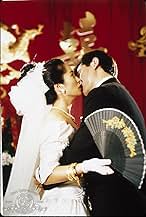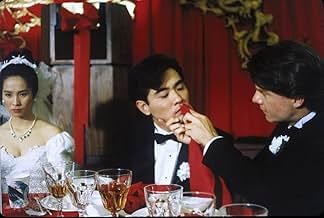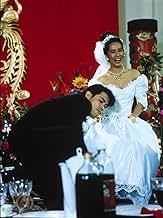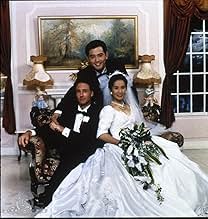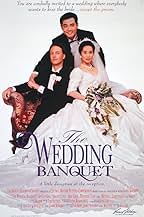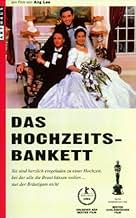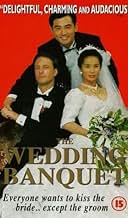Per soddisfare i suoi fastidiosi genitori, un padrone di casa gay e la sua inquilina celebrano un matrimonio di convenienza, ma i suoi genitori vengono a trovarlo e le cose sfuggono di mano.Per soddisfare i suoi fastidiosi genitori, un padrone di casa gay e la sua inquilina celebrano un matrimonio di convenienza, ma i suoi genitori vengono a trovarlo e le cose sfuggono di mano.Per soddisfare i suoi fastidiosi genitori, un padrone di casa gay e la sua inquilina celebrano un matrimonio di convenienza, ma i suoi genitori vengono a trovarlo e le cose sfuggono di mano.
- Regia
- Sceneggiatura
- Star
- Candidato a 1 Oscar
- 13 vittorie e 11 candidature totali
- Mrs. Gao
- (as Ah-Leh Gua)
Recensioni in evidenza
And while I found the ending of this movie somewhat unrealistic (I'll let other viewers decide) I also found the film challenging and optimistic (which is where my realism takes over).
You should watch this movie if you are Asian gay Asian AND gay or simply want to learn something about another culture. You might be surprised!
Props to Ang Lee for creating a unique opportunity to look into two very distinct and different cultures at the same time: Asian American and gays in the early 90s.
I recommend it highly.
Wai-tung (Winston Chao) is a gay Taiwanese landlord in New York with his boyfriend Simon (Mitchell Liechtenstein). Having not admitted his sexual orientation to his parents, he is pressured by them (and tradition) to get married and to have son to carry the Gao name. Meanwhile, Wei-wei (May Chin) is on the edge of poverty. An Chinese artist living in one of Wai-tung's derelict buildings, she is looking for a green card to avoid deportation. Noticing both situations, Simon suggests they marry out of convenience, but things go wrong when Wai-tung's parents come over to New York and a wedding banquet is held.
Although such a story today would have been regarded as a ordinary for a film plot, Lee's vision at the time it was made was fairly radical for certain sections of society at the time, particularly in conservative Taiwan. Lee pushed the boundaries, even including the first gay kiss scene to appear on Taiwan's screens.
Despite the ground-breaking story and the fact that I am watching it almost 12 years after it was made, I didn't feel that there was a sense of believability in the first half of the film. Characters were very 2D and lacked depth. There was a lot of missing chemistry on-screen, and for most of the first half, I did admit I was a little bored. The second half after the banquet takes place, though, was much better. As the characters are exposed and plots unfold, the story becomes more interesting and was much easier to watch.
However, one other gripe is the fact that the humour doesn't quite make its mark in the movie. There are plenty of opportunities to add the little smiles on peoples' faces, but the attempts to do so were fairly weak. The only time I let out a chuckle was in the City Hall wedding ceremony. Simply put, it doesn't match Ang's third film, Eat Drink Man Woman, in this respect.
Overall though, this is a watchable film, and you can easily see that Lee has developed his techniques quite a long way since his early films. The Wedding Banquet certainly demonstrates why people had faith in him and recognised his talent in the early days. One for a look back.
The script by director Ang Lee, and associates Neil Peng and James Schamus have written a crackerjack story full of things that never have hit the screen before. The wedding banquet itself is full of such insightful details about contemporary Chinese-American life and sentiment that there seems something accomplished that's new to the movies. When the wedding party invades the honeymoon suite, you feel like the writers have a firm grasp on the people they are presenting us, as if they know them, inside and out. I have seen five movies directed by Ang Lee, and this (and maybe his earlier "Pushing Hands") is the only one in which I felt he had a deep understanding of the characters, and for that matter, of human nature and human love.
Filial piety may not be a new thing for the Chinese, and maybe that is why this movie feels rooted, grounded. Wai-Tung who is a successful businessman and landlord commands respect among his colleagues, but when he's with his parents, he's still their little boy. You laugh as this grown man walks with his father, head bowed, keeping exact pace, two steps back, and you realize the secret of the older man's hold on his imitator. Wai-Tung loves his parents, and he knows what they expect. He's ashamed that he doesn't want to fulfill their dreams, that he wants a life of his own, that he didn't turn out as they hoped. But he also cares about his lover Simon, and you know what has drawn them together is that they care about other people. (Simon is a physical therapist who likes lecturing his clients; Wai-Tung tries to appear in charge, but he always seems to be taken advantage of by the people around him.) This concern for others is what draws us to Wai-Tung, and when his parents appear, you know exactly why he's going along with deceiving them.
Winston Chao is handsome and lithe, and he's good at playing a frazzled, bewildered, well-meaning lump. Yet he wouldn't be so likable, if it were not for the propinquity of Mitchell Lichtenstein who clearly has the expressiveness the movie needs. Although the movie comes dangerously close to being one about gay men in love who, in their most private moments, look like the most they do is shake hands, Lichtenstein ("Streamers") manages with the subtlest means to convey a sexual connection. The scene in which Simon presents a cell phone as a gift and carries on a conversation to test it affords Lichtenstein the chance to show what heat he can generate on the screen when he's called to do so. It makes evident how lucky a man Wai-Tung is, and why he'd allow himself to be emotionally torn for so long.
But the most compelling performances here come from Sihung Lung (who played the unwanted father-in-law in "Pushing Hands") and Ah Lei Gua as Mr. and Mrs. Gao. Lung conveys Old-World benevolence that pretty much dictates where this movie goes. He more than fills the shoes of the aging warrior, taking the last few steps that will make his life complete. He grants Mr. Gao a share of dignity his work here rightly deserves. Yet it is Ah Lei Gua who convinces me that she is fully in character. Whether she is bursting into tears over the shabbiness of the civil wedding, or trying to overlook her daughter-in-law's clumsiness in the kitchen, or keeping Simon at a distance when she learns his real position in her son's life, you sense an actress of the highest rank who knows intuitively the character she has been given to play.
With May Chin who, I hear, is very popular in Taiwan, and here carries herself with porcelain elegance. Her Wei-Wei is an enigma, a woman with a penchant for handsome gay men, and the movie is content with leaving her that way. You come away as uneasy about the arrangement she struck with Simon and Wai-Tung as Mrs. Gao is, who exits weeping. When Ang Lee slows down the camera at the end, as Mr. Gao raises his arms to be inspected at the airport gate, the director in spite of himself belies the thought that the old soldier has surrendered to a new enemy--the craziness and the self-indulgence of the next generation. The plangency of that last shot remains with you for a long time.
Ang Lee is one of the best film directors working these days. This is a small film in comparison to what came afterward. The story of how parents in a conservative society view their children that are "different" is always an interesting idea. Those same parents produced that child; the mere idea they will turn their backs to a son who is living openly as a gay man is a complex problem, at best.
Different cultures react differently, as is the case in this film. While the parents are not completely taken over by the way they discover their son has turned out to be, they go along with the flow, never condemning the son, his partner, or the young woman who is pretending to be, what she is not.
The acting is good in general, but it has to be the actor who plays the father, who ultimately wins one's heart. His culture goes back for centuries and he is won by his son's lover because he sees how kind, decent and honest he really is.
It's better never to judge, or so it seems that Ang Lee is telling us.
Lo sapevi?
- QuizWinston Chao had been an airline steward for seven years and had never acted in a film before when Ang Lee cast him as Wai-Tung. Three to four hours every day were spent to teach him how to act.
- BlooperDuring the small family dinner to which Simon treats the newlyweds and Wei-Tung's parents, Simon can be seen to alternately hold chopsticks, a small bowl or nothing in his left hand, depending on the camera angle.
- Citazioni
Justice of the Peace: Okay, now you: "I, Wee-Wee..."
Wei-Wei: Wee-Wee.
Justice of the Peace: "... take you, Wai Tung..."
Wei-Wei: Wee-Wee.
Justice of the Peace: Okay. "To be my wedded husband... to have and to hold..."
Wei-Wei: Holding to have, husband, mine...
Justice of the Peace: "... for better, for worse, for richer, for poorer..."
Wei-Wei: Better and richer, no poorer.
Justice of the Peace: "... in sickness and in health, till death do us part."
Wei-Wei: Till sickness and death.
Justice of the Peace: Groovy. Rings.
- Versioni alternativeRemade as the English language version "The Wedding Banquet" (2025), with James Schamus co-writer on both.
- Colonne sonoreThe Wedding Banquet
I più visti
- How long is The Wedding Banquet?Powered by Alexa
Dettagli
- Data di uscita
- Paesi di origine
- Lingue
- Celebre anche come
- El banquete de boda
- Luoghi delle riprese
- Aziende produttrici
- Vedi altri crediti dell’azienda su IMDbPro
Botteghino
- Budget
- 1.000.000 USD (previsto)
- Lordo Stati Uniti e Canada
- 6.933.459 USD
- Fine settimana di apertura Stati Uniti e Canada
- 134.870 USD
- 8 ago 1993
- Lordo in tutto il mondo
- 6.933.459 USD
- Tempo di esecuzione1 ora 46 minuti
- Colore
- Proporzioni
- 1.85 : 1
Contribuisci a questa pagina




